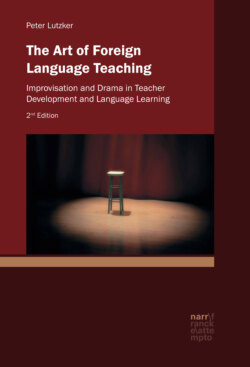Читать книгу The Art of Foreign Language Teaching - Peter Lutzker - Страница 43
На сайте Литреса книга снята с продажи.
4 An Empirical Study of Clowning Courses with Vivian Gladwell – Research Design 4.1 The Choice of the Clowning Courses
ОглавлениеThe choice to conduct an empirical research study on the clowning courses, instead of any of the other artistic workshops was made for a variety of reasons. Despite the many similarities between clowning and the other courses, the differences are significant.
As will become evident in the description of the clowning workshops and in the participants’ responses, it lies in the very nature of theatre clowning and improvisation that unique opportunities of addressing critical and complex pedagogical issues are continually presented. Those attributes of artistry in teaching that have consistently been viewed as decisive, including fluidity, creativity, sensitivity etc., are all contingent upon acting and re-acting in a given moment. In contrast to theatre, an artistic lesson is not an uninterrupted, rehearsed performance, but a highly dynamic process resulting from the continual interaction between pupils and teacher. In this sense, it is highly dependent on improvisatory skills which, in turn, are based on an entire set of requisite capabilities, most notably a high degree of openness, perceptual awareness, flexibility and presence. Such skills constitute the basis of theatre clowning and, in vital respects, can also be considered to be the basis of artistry in teaching.
Learning to develop such capabilities in the highly focused context of clowning improvisations can be a demanding process. The most common hindrance is generally that self-critical, judgemental ‘inner voice’ which Blake called one’s ‘Spectre’. Through continually passing judgements, this inner voice can effectively block any process dependent on imaginative and spontaneous action/s. This type of critical self-evaluation is often tied to fears of making mistakes and fears of failure. In encouraging teachers to develop a fundamentally different attitude towards their doubts, fears and insecurities, clowning addresses this level of behaviour directly. In doing so it also touches on those types of feelings in teachers, which are often the prime hindrance to their pupils’ developments. Particularly in foreign language learning, it is pupils’ fears of making mistakes and their feelings of being incompetent which often stand in the way of their acquiring that willingness to take risks vitally necessary in learning a foreign language. In a theatre clowning workshop in which teachers gradually learn to improvise spontaneously and creatively through freeing themselves from their own judgements, this decisive pedagogical process is experienced first hand by the teacher. Thus, more directly than in any of the other drama courses, a clowning workshop offers participants many chances to directly confront these types of anxieties in the context of artistic work, and also gives them an opportunity to experience such difficulties and themselves from a new perspective.
It is partially in light of the above considerations that I chose to focus on the clowning workshops. However, there were a number of other factors that also led to this choice. Both the structure and manner of working remain relatively constant in all of Gladwell’s workshops, in contrast to the other drama workshops which tend to vary more widely from year to year. This clearly lends itself better to general descriptions of their content and structure. The fact that he also described his own workshops in his Masters Degree was a further help.206 Moreover, as he has also worked extensively with other professionals including doctors, therapists, nurses and ecologists, there are chances of drawing parallels and distinctions to his work in other social professions. In this respect it has proved helpful that there has been an increasing body of articles published in various fields regarding his work.
Finally, since he also worked with Steiner School language teachers outside of the English Week, in the context of the English Fortnight at Emerson College for two summers, in the Baltic Seminar, in Helsinki, Finland for one summer and in the framework of intensive weekends in Witten-Annen, Germany, there were possibilities to get feedback responses from a greater number of teachers, including some whom I had never met (all those from the English Fortnight), and others whom I did not know from the English Week (I was a guest lecturer in January, 2005 at the Baltic Seminar). Thus, a potential corrective was offered to what otherwise could have conceivably been considered a problem in the research design – whether teachers’ responses to a clowning workshop in the English Week could have been consciously or unconsciously affected by their knowledge of my role as one of the organizers responsible for the courses.
